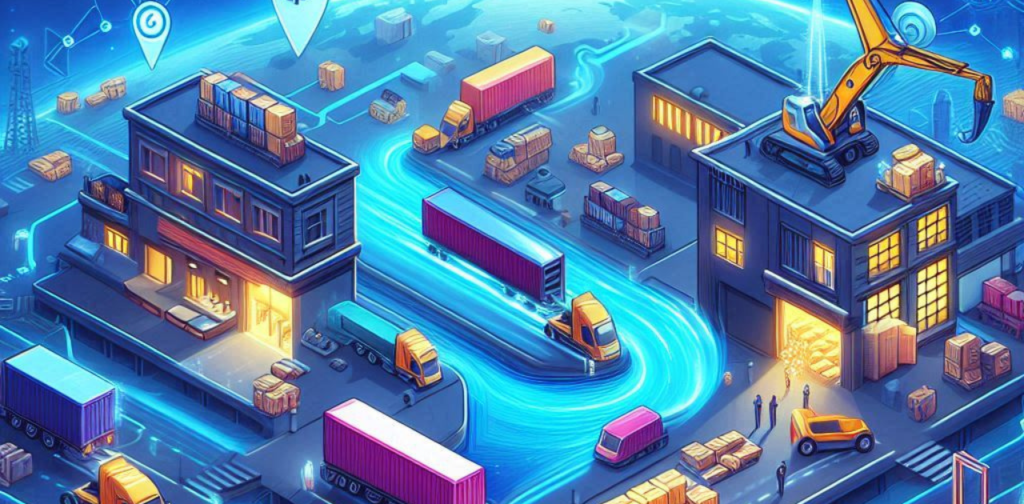Contents
Revolutionizing the flow of goods: The potential of blockchain for supply chain management
Supply chains, the complex networks that bring goods from production to consumption, are often plagued by inefficiencies, lack of transparency, and vulnerabilities to fraud. Blockchain technology with its core principles of decentralization, immutability, and security emerges as a game-changer, offering immense potential to revolutionize supply chain management. This article explains how blockchain can transform the way goods are tracked, streamline processes, and foster trust within the supply chain ecosystem.
A transparent journey: The impact of blockchain on supply chains

- Increased traceability: Products can be given unique identifiers recorded on the blockchain, enabling real-time tracking of their movement across the supply chain.
- Improved transparency: All participants in the supply chain have access to a shared ledger, providing transparency into product origin, quality, and ethical sourcing.
- Fraud Reduction: The tamper-resistant nature of blockchain makes it difficult to alter data, thereby reducing the risk of forgery and fraudulent activities.
- Streamlined Processes: Automating tasks such as document verification and payments through smart contracts can significantly improve efficiency.
- Increased Visibility: Increased visibility into inventory levels and product movement allows for better logistics planning and risk management.
Here is a table comparing between traditional supply chain management and blockchain-powered solutions:
| Feature | Traditional Supply Chain Management | Blockchain-Powered Supply Chain Management |
|---|
| Traceability | Limited visibility and traceability | Real-time tracking of goods across the supply chain |
| Transparency | Opaque and prone to information manipulation | Transparent and shared ledger accessible to all participants |
| Fraud Prevention | Vulnerable to forgery and fraudulent activities | Tamper-resistant records reduce the risk of fraud |
| Efficiency | Manual processes and paper-based documentation | Streamlined processes with smart contracts |
Visibility | Limited visibility into inventory and logistics | Increased visibility for better planning and risk management |
Building a more efficient ecosystem: Challenges and opportunities

While the potential of blockchain for supply chain management is undeniable, certain challenges remain:
- Scalability: Blockchain technology is still evolving, and scalability limitations may hinder its application in large-scale supply chains.
- Integration: Integrating blockchain with existing legacy systems within organizations can be complex and require significant effort.
- Standardization: Lack of standardized protocols across different blockchain platforms may create interoperability challenges.
- Regulation: Uncertain regulatory frameworks around blockchain may make it hesitant for businesses to adopt the technology.
Despite these challenges, the opportunities are plentiful:
- Improved collaboration: Blockchain promotes trust and collaboration between different stakeholders within the supply chain.
- Reduced costs: Efficiency gains and fraud prevention can lead to significant cost savings across the supply chain.
- Sustainable practices: Transparency can promote ethical sourcing and sustainable practices within supply chains.
- Increased consumer trust: Consumers can gain greater confidence in the authenticity and origin of the products they purchase.
Conclusion: A path towards a more connected future
Blockchain technology has the potential to transform supply chain management by creating a more transparent, efficient, and secure ecosystem. By tackling existing challenges and fostering collaboration, businesses and regulators can unlock blockchain’s true potential for a more connected and sustainable future of global trade.
Frequently Asked Questions
- How are companies already using blockchain in supply chain management?
Many companies are testing blockchain-based solutions to track goods, manage inventory, and ensure product authenticity.
- What are the benefits for consumers of blockchain-powered supply chains?
Consumers can benefit from greater transparency about the origin and quality of products, thereby promoting informed purchasing decisions.
- What is the future of blockchain in supply chain management?
As the technology matures and regulations evolve, blockchain is expected to play an increasingly central role in shaping more efficient and trustworthy global supply chain networks.

